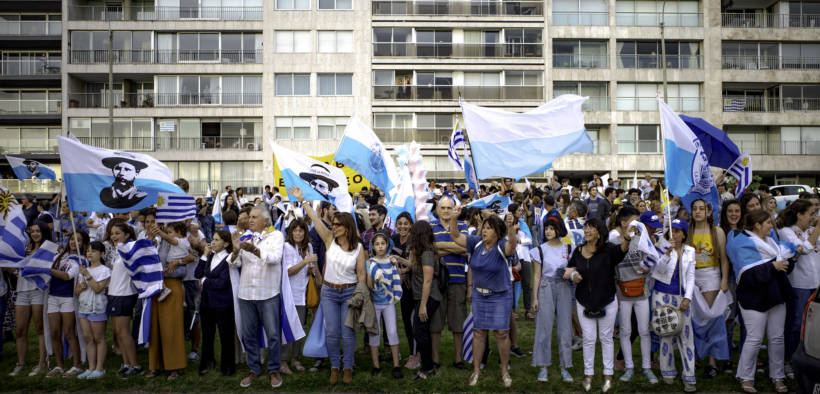Right-Wing Luis Lacalle Pou Wins Uruguay’s Presidential Election

Luis Lacalle Pou’s victory ushers in a conservative government and ends the rule of the left-wing Frente Amplio coalition after 15 years in power during which Uruguay saw major social and economic gains.
(Peoples Dispatch) Luis Lacalle Pou of the right-wing National Party emerged as the winner of the second round of Uruguayan presidential elections held in the country on November 24. According to the counting of the remaining 0.6% of the votes or around 35,000 “observed votes”*, the trend is irreversible.
Before the Electoral Court announced the official results, Daniel Martínez of the ruling left-wing government of Frente Amplio (Broad Front), conceded his defeat and greeted the newly elected president.
“The tendency does not change as the vote count is scrutinized further, therefore we congratulate president-elect Luis Lacalle Pou. I thank everyone who trusted us with their vote from the bottom of my heart,” tweeted Martínez.
The National Party celebrated the victory. “Uruguay now has a new president,” wrote the party on its Twitter account.

Luis Lacalle Pou and his wife Beatriz. (Photo: lacallepou.uy)
The president of the Frente Amplio, Javier Miranda, also congratulated the new president of the Republic. “We will assume from March 1, 2020, the role of the opposition and from there we will contribute to the construction of the best possible Uruguay,” tweeted the Frente Amplio.
On Sunday night, following the elections, when 99.4% of the votes counted, Lacalle Pou had a lead over Martínez with a slim margin of 1.26%. Lacalle Pou secured 48.74% of the votes, while Martínez obtained 47.48% of the votes. The difference of votes between the two candidates was around 30,000, but was less than the number of “observed votes”, which was more than 34,500. Thus, the Electoral Court deemed the election results too close to call and announced that a clear winner couldn’t be declared until all votes were counted.
After counting 75.37% of the “observed votes” from 13 out of 19 departments, Lacalle Pou obtained 3,090 more votes, which made him a clear winner of the elections.
Lacalle Pou will assume office on March 1, 2020, for a period of five years. During his election campaign, Lacalle Pou indicated that he would change the country’s foreign policies in order to boost the economy. He promised to increase employment opportunities in the country. He also vowed to work in the fields of public security, education and housing.
His victory ushers in a conservative government and ends the rule of the left-wing Frente Amplio coalition after 15 years in power, during which Uruguay has saw economic stability and growth, as well as significant social gains such as the legalization of abortion, same-sex marriage and the expansion of transgender people’s rights.
Multicolor, a coalition of right-wing and center-right parties, formed by the president-elect to win the runoff election, will now have the majority in the parliament. Lacalle Pou will face the challenge of keeping them united despite their disparate ideologies at a tumultuous time in the region.
Also, It remains to be seen if he will continue with the many progressive measures introduced by the outgoing government of president Tabaré Vázquez.
*Voting is obligatory in Uruguay. When a voter can’t cast their vote at the assigned electoral table due to a justified impediment, they can do so at some other table under the condition of an “observed vote”. The counting of these votes is carried out later, thus the process to incorporate their ballot into the overall election usually takes longer and is not reflected in the preliminary results.







